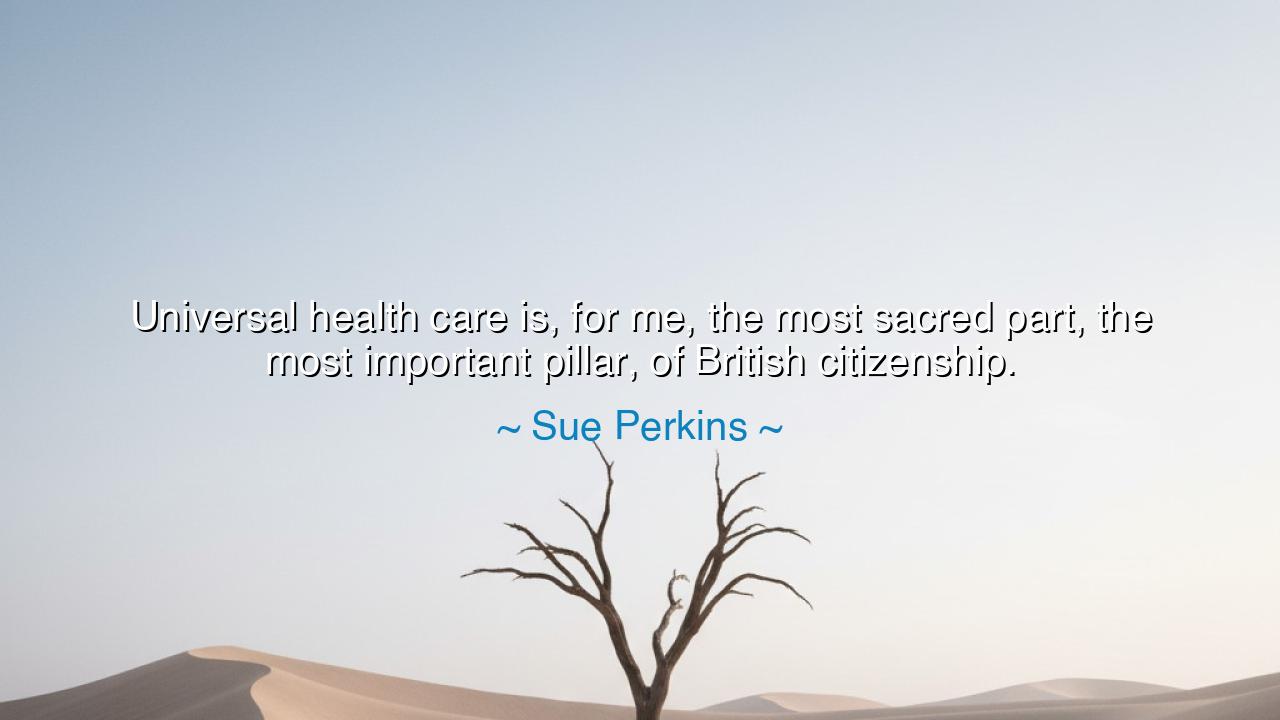
Universal health care is, for me, the most sacred part, the most
Universal health care is, for me, the most sacred part, the most important pillar, of British citizenship.






“Universal health care is, for me, the most sacred part, the most important pillar, of British citizenship.” Thus spoke Sue Perkins, a daughter of Britain whose words carry both gratitude and reverence. She does not speak as a politician, nor as a scholar of systems, but as one who feels deeply the moral soul of a nation. In this declaration, she lifts the idea of universal health care from the realm of policy to that of sacred duty — a covenant between the people and the society they have built. Her words remind us that to care for the health of all is not a mere act of governance, but an act of collective compassion, the truest expression of civilization.
The origin of this belief lies in the story of post-war Britain, when, after the darkness and devastation of the Second World War, a weary people sought to build something more enduring than empire — a society grounded in equality and care. From that resolve was born the National Health Service (NHS) in 1948, a promise that every citizen, regardless of wealth or class, would receive care in sickness and in pain. It was a triumph not of wealth, but of will — a moral awakening that declared: “No man shall be denied healing because of poverty.” And from that hour, the NHS became more than an institution; it became, as Perkins calls it, a pillar of citizenship, a symbol that to belong to Britain is to be protected by its compassion.
In calling health care sacred, Perkins speaks in the voice of the ancients who understood that to heal is divine. The temples of Asclepius in Greece, where priests tended to the sick, were not merely hospitals but holy ground. The Hippocratic Oath, sworn by physicians, was both a vow of science and of spirit. Likewise, the modern idea of universal care arises from the same wellspring of belief — that life and dignity are sacred trusts, and that the health of one is bound to the health of all. When Perkins names it sacred, she restores this ancient reverence to the modern age, reminding us that medicine, when freely shared, is not just a service but a sacrament of love.
Consider the tale of Aneurin Bevan, the visionary founder of the NHS. He was born into poverty in the Welsh coalfields, where men labored and died with no access to proper care. When he became Minister of Health, he carried in his heart the memory of those who suffered unseen. “No society can call itself civilized,” he declared, “if a sick person is denied medical aid because of lack of means.” With courage and conviction, he forged the NHS against fierce resistance, declaring that the health of the people is the greatest wealth of the nation. His work gave flesh to the ideal that Perkins now honors — the belief that compassion, when enshrined in law, becomes the highest form of strength.
In her words also lies a quiet defiance — a reminder that what is sacred must be guarded. For as time passes, the flame of collective duty dims under the weight of bureaucracy, greed, and forgetfulness. Perkins’s reverence is thus a call to remembrance: that universal health care was not granted easily, but won through struggle, born from the ashes of war and sustained by the sacrifice of generations. To her, it is not merely a benefit of citizenship but its very soul — a symbol that the state serves not the powerful, but the vulnerable. When the sick are healed freely, the nation itself stands healed.
There is wisdom here for all peoples, not only those of Britain. For every society must ask itself: What do we hold sacred? If a nation’s greatness is measured by its compassion, then the care it offers to its weakest members reveals its true character. When we choose to heal without judgment, we affirm that every life has worth beyond measure, that the poor man’s fever matters as much as the rich man’s comfort. Universal health care, in its truest form, is the embodiment of justice — the practical face of love.
Therefore, O listener, take this lesson to heart: to care for another’s health is to defend the sanctity of life itself. Do not let cynicism erode what generations built with hope and toil. Whether you heal with hands or words, whether you support the sick through service or through compassion, know that every act of care strengthens the sacred bond that binds society together. As Sue Perkins reminds us, the health of the nation is not in its wealth, its armies, or its monuments — but in the mercy it shows to its people.
For when a people see healing as holy, when they build their citizenship not on privilege but on care, they create a civilization that honors both the body and the soul. And such a nation — compassionate, just, and steadfast — shall endure long after wealth and power have faded, because it stands upon the strongest foundation of all: the shared humanity that makes us one.






AAdministratorAdministrator
Welcome, honored guests. Please leave a comment, we will respond soon